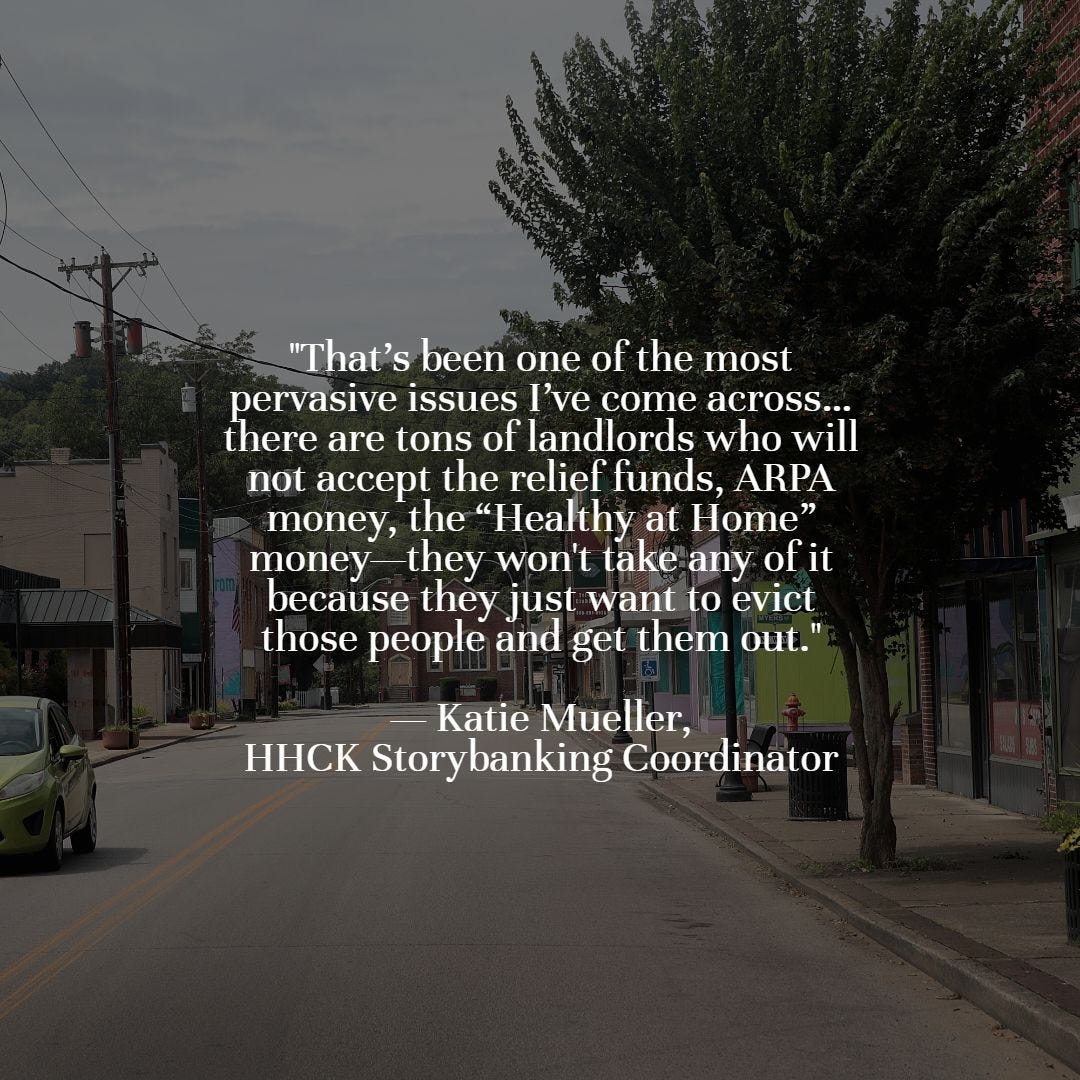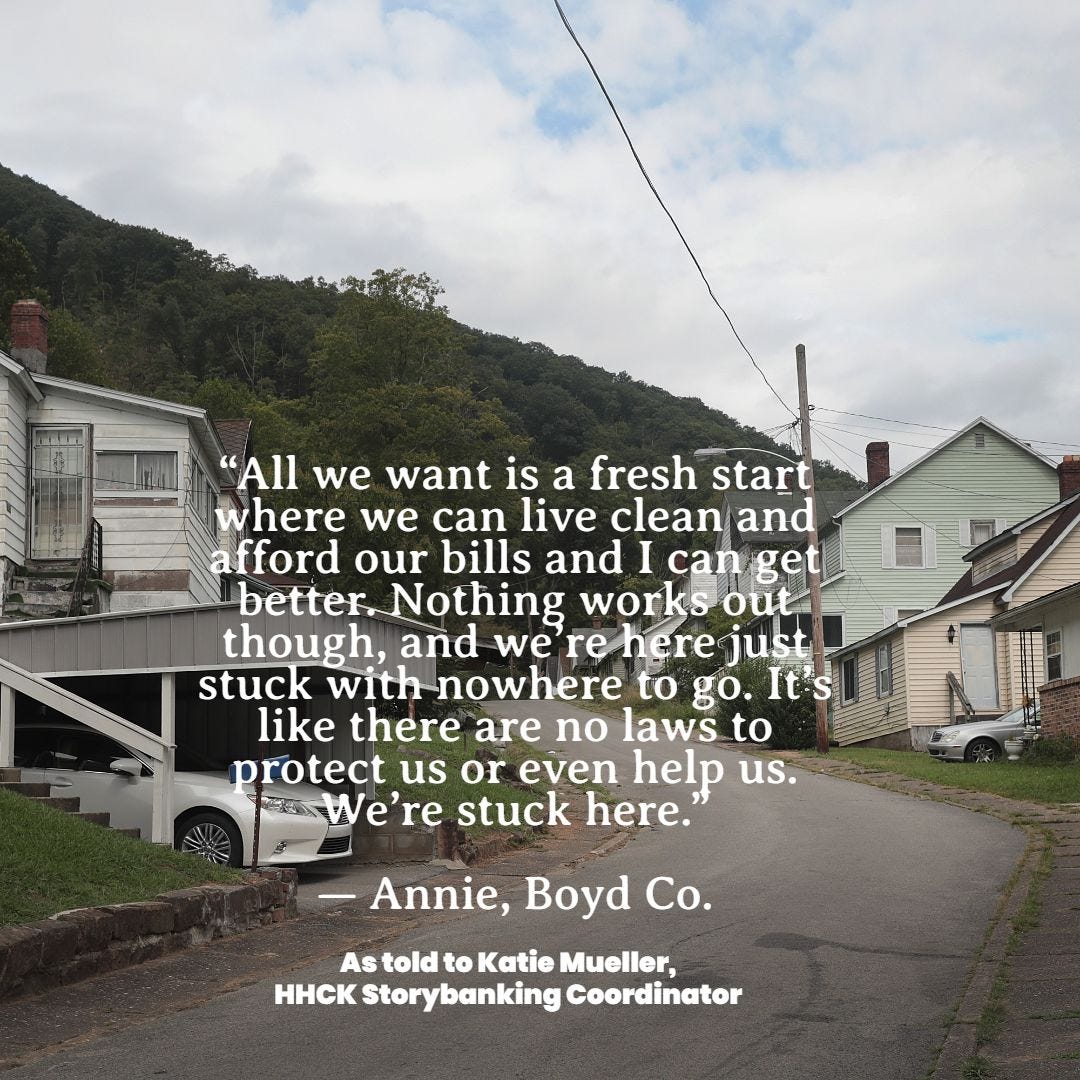“We have a pretty lasting phrase—housing is healthcare—and that is the truth."
Homeless and Housing Coalition of Kentucky's Katherine Mueller is collecting the stories of housing insecure Kentuckians during COVID-19.
“We have a pretty lasting phrase—housing is healthcare—and that is the truth,” says Katherine Mueller, Storybanking Coordinator for the Homeless and Housing Coalition of Kentucky (HHCK).
Since early 2021, Mueller has been documenting the stories of families across the state who have struggled to find housing—or stay housed—during the pandemic. Serving as both a sounding board for those in need and oral historian capturing this particularly bleak moment in time, Mueller’s work to build a repository of first-hand accounts from housing insecure Kentuckians as COVID-19 continues to rage—and the federal eviction moratorium ends—should be viewed as a model for how to center the voices of vulnerable populations in reporting. (Journalists, take note!)
Below, Mueller discusses the challenges of story-collecting during COVID, the “wild west” of Boyd County and why landlords are turning down relief money.
If you’d like to contribute your experience to HHCK’s storybanking project, use this survey or click here for more information.
If you’re a renter in search of county-specific (!) information about rental assistance, legal help or evictions, KyRenterHelp.org is an invaluable resource.
What was it like when you started collecting stories about housing insecurity across Kentucky in early 2021?
Vaccines were still super limited at the time, so I just started out cold with a lot of phone calls and social media. I was posting in mutual aid groups, explaining what [HHCK] does and saying, “I'm looking for people to talk to who are having trouble accessing housing.” At first, we were asking about COVID-19 related [housing insecurity] specifically, but most of the people who were having problems getting—or staying—housed during COVID were having problems with it before, too.
Pretty soon, I realized that I was doing this initial outreach in the middle of these horrible weather events that kept happening across Eastern Kentucky. Nobody wants to talk when they're trying to keep food from ruining in the fridge because their power's been off for 12 days and the electric company can't fix it all the way up and down the road.
A secondary problem getting folks to talk was that they had set minutes on their phone, or their phones had gotten turned off. Some people might not have had the money to pay their phone bill because all their diapers and baby products got flooded, so they had to spend money on that instead. No matter what, your baby has to have diapers and your kid needs his inhaler, so that's what you're paying for. The phone bill can wait.
On the other hand, a lot of folks really wanted somebody to talk to—they needed a sounding board and somebody to listen to them. These folks were stressed out: traumatized from COVID and from the bad weather that was happening over and over. People were just in a [state of] emotional release.
Are people reluctant to tell their stories?
As far as housing advocacy goes, folks are a little bit nervous to talk about it. They're afraid that if they have to go back—even if they've gotten out of using Section 8 or public housing for now—if they have this interview out there, they’re afraid of being seen as complaining tenants and nobody's going to want to rent to them anymore. And that is a huge fear. Huge. They know that landlords talk to each other: they have Facebook groups; they have meetings; they've got more money; they can communicate more often. People are scared to complain when it comes to housing.
And a lot of landlords won't take the relief money that the government’s been offering. They just won't take it. That's been one of the most pervasive issues I’ve come across…there are tons of landlords who will not accept the relief funds, ARPA money, the “Healthy at Home” money—they won't take any of it because they just want to evict those people and get them out. I mean, this is guaranteed money backed up all the way to, I think, April 2020 and up to three months ahead. I have never seen such mean-spirited behavior ever. You see the best of people and you absolutely see the worst when you're wading through this stuff.
There’s so much trauma [housing insecure] folks have been through, whether it’s having a landlord knock on your door every day or being scared that when you come home from the grocery store, all your stuff is going to be out on the sidewalk. That’s something I hear over and over from folks: they're afraid to leave their house in the middle of all these eviction proceedings. They're scared that if they go down the street or take their kids to the park, they're going to get back and the landlord is going to have chucked all their stuff onto the sidewalk and locked them out. It’s so cruel.
And that's the real kicker. There's been all this rent relief money for landlords to recoup their losses and pay off the bank. But so many of them…just want to twist that screw a little bit more into these folks. And an eviction on your record, my god, that's like having a felony, you know?
Are there any smaller communities that stand out as having major housing issues?
I've had a lot of folks contact me from Ashland and Boyd County. Ashland’s like the wild goddamn west—and you can quote me on that. There's no housing. There's no rules at all. I mean, I'm sure there are, but apparently nobody's following them as far as code enforcement and maintenance go.
One lady was really scared to talk to me at first. And I was like, “Look, I'm from Martin County right below you. I would never put a bad story up or betray you or anything like that. We're just trying to help people understand.”
She’s living in this trailer with her husband, and the landlord of the trailer is—stay with me here—the best friend of the husband's ex-girlfriend, so she won't fix anything. But there is such a pervasive lack of affordable housing in Boyd County that [the landlord] knows there's nowhere else for them to go.
For example, the kitchen sink was broken—totally backed up, didn't work—so they were running water into a Tupperware bin in the bathtub to do their dishes. Then the pipes froze under the trailer, and they called a plumber to come fix it, but the landlord would not permit the plumber to cut the padlock off of the trailer’s underpinning to get to the pipes. It was just a real power play on the landlord's part.
I’ve gotten so many calls out of Boyd County that are like that.
(Read Annie’s full story via HHCK’s storybank here.)
What are some large-scale changes that should be happening to address houselessness in Kentucky?
The answer to homelessness is to give people homes, right? Well, the current average wait for Section 8 [housing] is like two or three years, and sometimes it's four or five. That's a big thing we're trying to focus on is that there has to be more funding directed towards those Section 8 vouchers and also just towards units. And I know that seems like the simplest thing in the world, but we need more apartments and condos and homes. We need more places to help people move into.
It's just shameful the way that we're shoving people out of places. And I don't have the answers, but I know one of the answers is definitely allocating more money toward Section 8 vouchers to help people over the hump and have places for people to go. I've never understood the bootstrap narrative. A lot of people don't have bootstraps. They just don't have them. It's a hand up, definitely not a handout, and people need that.
We’ll be back Thursday with a look at a new project focusing on religious iconography in Eastern Kentucky and beyond. If you know someone who’s always pointing out roadside Bathtub Madonnas, why not share a subscription with them?
Interview condensed for length and clarity.
Text image background photos via Getty Images Plus (Credit: Nate Hovee, Scott Olson, Cris Ritchie)






